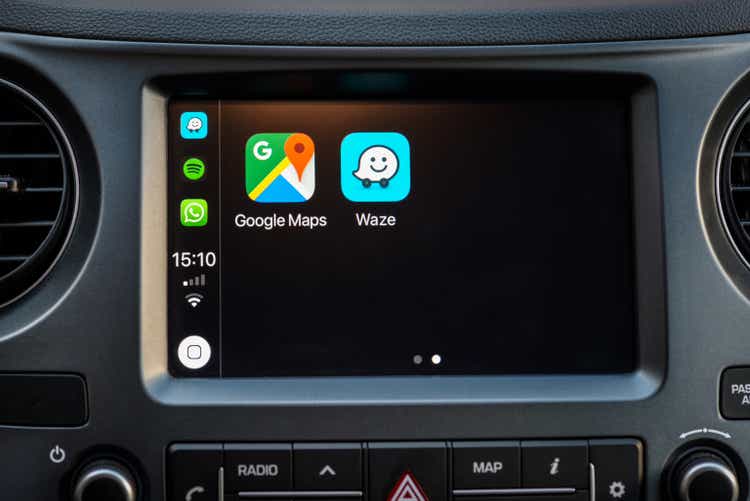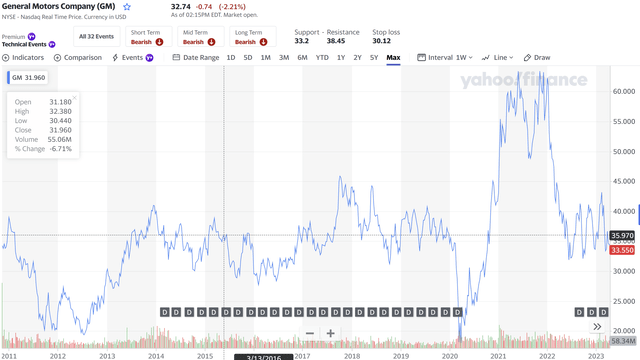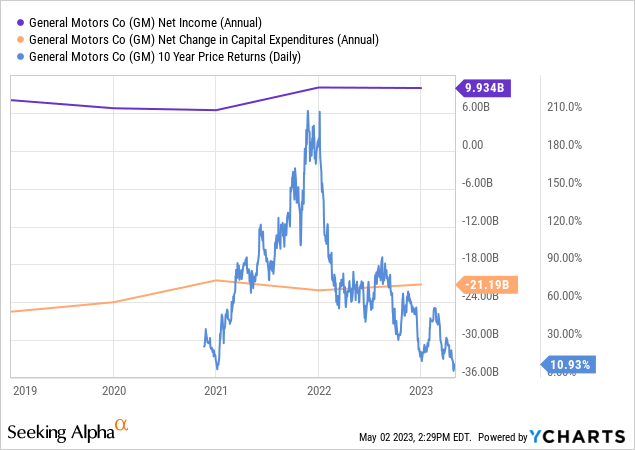
Apple Carplay screen in car dashboard displaying Google Maps and Waze apps
Allard1/iStock Editorial via Getty Images
Buyers of GM's (NYSE:GM) 2024 Chevrolet Blazer BEV scheduled to reach retailers this summer may be startled to discover that their new electric vehicle doesn't offer Apple CarPlay, an increasingly common software program that mirrors their iPhones and its apps on the dashboard's screen.
Nor will Blazer offer Android Auto, a software mirroring program for Android phones powered by Google software. Instead, the new Blazer will feature a GM-designed infotainment center based on a Google operating system. GM's built-in system will accommodate a few common apps such as Spotify and Audible. A smartphone will be able to pair, via Bluetooth, for incoming and outgoing calls.
Carbon to electrons
From a world where ICE models have been judged mainly in terms of fuel economy, horsepower and visual design, BEVs increasingly are evaluated by the performance of their software and infotainment systems - standards that could determine a vehicle model's popularity and raise a brand's prestige.
A big question mark will be whether consumers accept a GM-designed infotainment system - based on a Google operating system - instead of CarPlay or Android Auto as their gateway to music, navigation, shopping and other content. With its own platform, GM presumably will own and control the data generated by owners of its car. The 2024 Blazer will provide a test of this concept later this year. GM still must prove that it can monetize, as well as gain access to, data generated by its vehicles.
"About 37% of GM customers use Apple CarPlay," said Frank Hanley, a senior director of automotive benchmarking for J.D. Power & Associates. "66% of GM customers have an Apple iPhone. Customers, including Tesla customers, do want the feature."
GM's infotainment strategy is designed to deliver more features and functionality to owners of its cars and - perhaps more importantly - generate a revenue stream from downloaded software, apps and subscriptions that could reach $20 billion to $25 billion annually by 2030. Imagine that GM could charge $100 a month for Super Cruise, an advanced driver assistance program similar to what Tesla calls FSD, full self-driving. Tesla sells its FSD, delivered over the air, for $199 a month.
Subscriptions for features
Ford this week revealed that owners of its Mustang Mach-E will be able to purchase the Blue Cruise assisted driving software, after a trial period, by paying $2,100. The program can be activated by an over-the-air update. BMW has been testing consumer acceptance of heated seats, activated over the air, which it has been selling in some markets for $18 a month.
To build a remote transaction business with customers, GM and other automakers are moving to seize direct access to customer data, in some cases by removing Apple and other smartphones from the equation. (GM's ICE models and a few BEVs will continue to offer CarPlay and Android Auto. Ford offers the mirroring programs on all its models.)
GM, Ford Motor Co. and other incumbents have struggled for years - and mostly failed - designing infotainment systems for their vehicles that please customers as much as smartphones. Automaker expertise lies in areas such as mass manufacturing rather than software development. Cadillac's CUE system, introduced by GM in 2012 to much fanfare, finally was yanked from the brand in 2018 after multiple problems and poor customer reviews. For some Cadillac owners CUE difficulties were solved when the brand offered upgrades to Apple CarPlay or Android Auto.
An owner of GM's 2024 Chevy Blazer will be able to use the car's built-in mapping system to navigate to a destination. Unlike the navigation system in one's phone, the car's system will show charging stations along the route and coordinate information from the car's battery to tell the driver how much charge remains and which charging stations can be reached.
Bill we must
"We think this will be better for the customer," said Chad Lyons, a Chevrolet spokesman. "And since the announcement that CarPlay and Android Auto aren't offered we've had no cancellations" of advance reservations to buy Blazer. "This is one step on the journey towards generating more revenue, while designing better digital products to deliver and sell."
Neither Google nor Apple have thrown in the towel, each deciding for the moment to partner with the automakers rather than dig its heels in for full control of the instrument panel. That could change. As events and consumer reactions unfold, automotive-based programming and data could turn into significant revenue streams for the software companies, just as phones did.

GM stock since IPO (Yahoo Finance)

The battle of control of vehicle instrument panels and software systems is in an early stage, with GM yet to demonstrate that its digital systems will attract and retain customers. Along with the question of how quickly consumers will step up to BEVs, consumer reaction to vehicle dashboards poses a significant risk for investors. Certainly, $20 billion to $25 billion of additional revenue - given the higher margins that software usually yields - will make GM a much more attractive stock than it's been since the 2010 initial public offering.
Plan B possible
If the 2024 Chevy Blazer proves to be a hit for GM, its success will first of all prove that GM's optimistic forecasts of mainstream adoption for BEVs during the next decade are accurate. Secondly, a triumphant Blazer BEV may show that GM finally has created a digital platform that satisfies its customers and creates a new and profitable revenue stream.
Naturally, in the event GM's built-in flops the automaker can always reinstitute CarPlay and Android Auto, may even doing so via an over-the-air update.
GM remains a HOLD, in my opinion, though I'll be watching Blazer BEV sales (and pricing) later this year for reasons to adjust my rating.
"auto" - Google News
May 03, 2023 at 03:34AM
https://ift.tt/HhDGWVs
GM Ditches Apple CarPlay In Chevy Blazer, Latest Salvo In Auto Dashboard Wars (NYSE:GM) - Seeking Alpha
"auto" - Google News
https://ift.tt/IF9T84p
Shoes Man Tutorial
Pos News Update
Meme Update
Korean Entertainment News
Japan News Update
No comments:
Post a Comment